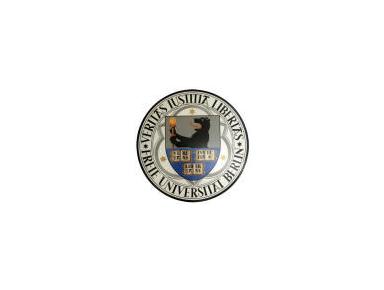The founding motto of the Freie Universität Berlin - "Truth, Justice, Freedom"- has shaped its history since 1948. With some 40.000 students in 2003 (without medicine) in approximately 100 different programs of study the FU Berlin is the largest university in Germany's capital, and one of the largest in the nation.
Owing to its internationally recognized achievements in both teaching and research, the FU exerts a strong attraction on students from Germany and beyond. The Freie Universität ranks among the top 20 universities in Germany in the external funding balance sheet of the Deutsche Forschungsgemeinschaft (German Research Council). The university's research activities in the Humanities and in the Social and Natural Sciences are distinguished by their international orientation, as well as by the interdisciplinary and collaborative character of work carried out by a number of research networks: the FU Berlin's twelve Collaborative Research Centers, eight Research Training Centers, six DFG Research Units and the participation in a DFG Research Center are ample evidence of this.
Today, about 415 professors (without medicine) are engaged in teaching and in research at the Freie Universität. In 2004 17,3 percent of professorships are occupied by women. Altogether, the Freie Universität employs more than 4,000 individuals, making it one of the region's largest employers.
The FU's Academic Profile
In the Humanities and Social Sciences, the university's teaching and research profile is characterized by the classical subjects in Languages and History, as well as in Law and Economics. Unique to the Freie Universität is its comprehensive ensemble of "little subjects", like for example Jewish Studies and Theater Studies, which fit well in Berlin's cultural landscape, with its unparalleled array of libraries and museums.
Political Science (Otto Suhr Institute) and Media and Communication Studies enjoy a strong tradition and popularity.
Solutions for global conflicts are developed in "Area Studies" in the John F. Kennedy Institute for North American Studies, the Institute for Eastern European Studies and the Institute for Latin American Studies. Besides Northern America, Eastern Europe and Latin America "area studies" also cover East Asia, the Middle East and single European countries like Italy or the Netherlands.
In the Natural Sciences, the focus is placed on interdisciplinary approaches in the Life Sciences and Earth Sciences, which are supplemented by Mathematics, Physics and Computer Science. Research work is carried out on applications of direct relevance for everyday life, together with basic research on topics ranging from the microbiological analysis of enzymes to quantum field theory.
Interdisciplinarity is particularly encouraged at the Freie Universität. The "BioCampus Dahlem" is one of the 15 Clusters of Excellence, as well as "Migration Studies", "Security" or "Esthetic Experience".
A meanwhile traditionally strong role is played by Gender Research.
Further the FU has one of 5 Veterinary Departments in Germany with broad medical care facilities.
In 2003 the Medical Departments of the Freie Universität and the Humboldt-Universität were merged to form the Medizinische Fakultät Charité - Universitätsmedizin Berlin (Medical Faculty Charité - University Medicine Berlin). As a result, Berlin and the FU have one of the largest and most modern teaching hospitals in Europe, providing excellent patient care.
The Campus
The central campus, including the Henry Ford Building and the "Rost-und Silberlaube", is located in Dahlem, a particularly green section of the city, and one with a distinguished tradition of scholarly achievement. Most of the university's institutes in the Humanities and in the Social and Natural Sciences and in Medicine, as well a the Central University Administration, are located on the Dahlem campus. Veterinary Medicine is located for the most part on its own little campus in Düppel. The Campus Benjamin Franklin of the Charité - University Medicine Berlin, with several medical institutes in Steglitz, constitutes an additional "mini-campus", as do the Earth and Communication Sciences, located in Lankwitz.
A special attraction for visitors from all over the world is the Botanic Garden and the Botanical Museum of the FU. More than 22,000 different kinds of plants are grown on the 43 hectare site, so that the Botanic Garden is one of the largest in the world in terms of species numbers. The Botanic Garden and the associated museum are an important element of the Berlin-Brandenburg science region, and they play an important role in international biodiversity research. Horticultural highlights include the tropical giant water lily Victoria amazonica, and the scientific treasures include the herbarium, a collection of dried specimens with an international reputation. The Botanic Garden brings together in a unique fashion the three elements of research, teaching and recreation, attracting some 400,000 visitors and visiting scientists from all over the world every year.
The Freie Universität is housed in approximately 230 buildings - many of them formerly privately-owned villas - scattered throughout several sections of southwest Berlin. Since the beginning of the 1990s, a growing number of facilities have been relocated to FU-owned buildings, thereby reducing reliance on rented villas.
Dahlem seems predestined as a location for the promotion of interdisciplinary research and development, and with various Max Planck Institutes in the direct vicinity, as well as the Zuse Institute Berlin (ZIB) working in the field of applied mathematics and computer science, and the Federal Institute for Materials Research and Testing, a lively exchange is always maintained.
Promote your business for free on Just Landed:
- 1.Sign up with or login
- 2.Set up a free business account
- 3.Edit your listing - get new customers
Send a message to Freie Universität Berlin (FU)
